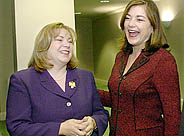|
Esta página no está disponible en español.
THE NEW YORK TIMES
Californians May Become 1st Sister Act In Congress
By GREG WINTER
March 8, 2002
Copyright © 2002 THE NEW YORK TIMES. All Rights Reserved.
 ----------------------- -----------------------
Linda T. Sanchez, a Congressional candidate, left, with her sister Representative Loretta Sanchez, whom she could join in Congress.
(PHOTO: Associated Press)
-----------------------
LOS ANGELES – From the moment the first speaker of the House, Frederick Muhlenberg, stepped into office alongside his brother John, so many sets of relatives have passed through Congress that historians sometimes liken it to prep school or college, where familial ties are an indelible part of the institutional fabric.
Yet after identifying at least 1,881 relatives who have made it to the Capitol, 16 percent of all federal lawmakers since 1789, Congressional historians are still scratching their heads to find a single instance in which a member's sister got a chance to serve as well.
"It's a sad commentary on equality in America," said Linda T. Sanchez, 33, the Los Angeles County Democrat who may change all that. With their dual victories in California's primary elections this week, Ms. Sanchez and her sister Loretta, 42, a congresswoman from Orange County who has been a heroine and a headache for the Democratic Party, are likely to become the first sister act in Congress. (Linda Sanchez's district, in southeast Los Angeles, has almost twice as many Democrats as Republicans.)
Perhaps it is fitting that they are also the children of Mexican immigrants, lawmakers and political analysts contend. Not only is California's Latino population bigger than any other state's, it is also increasingly mobilized, intent on seeing the political gains it has made at the state level reflected in national office.
"It's a sign of maturing politics for women," said Loretta Sanchez, who stormed onto the political scene in a 1996 election overshadowed by voter fraud, though not enough to eliminate her razor-thin margin of victory over a nine-term Republican congressman, Robert K. Dornan.
But are the Sanchez sisters really a sign of women's empowerment and the irrepressibility of the budding Latino vote or a political oddity born of a compromise that put them in the right place at the right time?
"The fact that the two sisters are going to serve together is more of a curiosity than anything else," said Dan Schnur, a Republican political strategist. "In terms of practical impact, once the new district lines were drawn the ideological makeup of the new congressman became pretty apparent."
By the 2000 census, California's population had inflated enough to earn an extra seat in Congress, requiring the state to redraw its intricate map of electoral districts. Democrats, eager to lock in the gains from previous contests, pushed a plan that parceled districts along partisan lines, making each one safely Democratic or Republican. Wary of losing more ground, Republicans consented, taking much of the guesswork out of future elections.
For Loretta Sanchez, who was chastised at the 2000 Democratic convention for planning a fund-raiser at the Playboy mansion, redistricting meant tacking on immigrant neighborhoods and lopping off conservative territory. For Linda Sanchez, a labor leader and civil rights lawyer who has never held office, it meant competing in a new district so thoroughly Latino that all three of the front-runners in the Democratic primary and the winner of the Republican nomination were Hispanic.
The only reason Linda Sanchez won, political observers from both parties say, was her sister's considerable influence. With no one to challenge her in her own district, Loretta Sanchez could afford to march the streets and knock on doors in her sister's district, not to mention share an exhaustive list of donors to help the campaign raise more than $500,000. Even their mother pitched in, reminding voters on Spanish-language television of the family ties between a political newcomer and one of Southern California's most well-known Latinas.
"The election just proves that Loretta Sanchez is one heck of a fund- raiser and one tenacious campaigner," said Allan Hoffenblum, a former Republican consultant, adding that Linda Sanchez stood "no chance" without her.
Though she has heard it many times, Linda Sanchez winces at the assertion of her political dependence on her sister. As a lawyer, she says, she built credibility in the community by representing farm laborers and employees in discrimination cases. In her union role, she won over workers by making sure bosses did not skirt the prevailing wage.
"It's never been questioned that brothers would run, or that fathers and sons would serve," said Linda Sanchez. "Suddenly, it's two sisters and you get the kind of criticism that `she wouldn't have been a viable candidate without her sister.' "
| 
